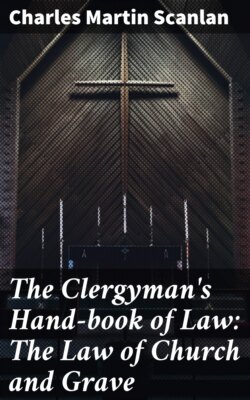Читать книгу The Clergyman's Hand-book of Law: The Law of Church and Grave - Charles Martin Scanlan - Страница 14
На сайте Литреса книга снята с продажи.
Chapter X. Heresy And Secession
ОглавлениеTable of Contents
122. Mother Church, Control.—A majority of the members of a congregation can not by their vote leave the church and transfer the property of the congregation to another church so long as any portion of the congregation remains faithful to the mother church of which such congregation forms a part. Such minority shall retain control of the property.221
123. Seceders, Funds.—Nor can seceders from a religious denomination retain the funds in their hands as trustees on the ground that they were members of the society when the funds accrued.222 The title to church property in a divided congregation is in that part of the congregation which is acting in harmony with its own law; and the ecclesiastical laws and principles which were accepted among them before the dispute began are the standards for determining which party is right.223
[pg 080]
124. Society, Foreign Language, Independent.—The formation of a society distinct from the rest of the congregation for the purpose of instruction in a portion of the doctrine of the same church in a foreign language is not a separation from the congregation, although it has its own minister and officers.224 Where an independent congregation of one denomination votes unanimously to go over to another denomination, and the title to the church property is in the parish corporation, the seceders take with them the church property.225
125. Subordinate, Incorporated.—A religious society subordinate to church judicatures, which declares itself independent and becomes incorporated under the general law of the state and subsequently purchases land and takes title in the name of the corporation, holds such land independently of such church judicatures.226
126. “Church,” Seceders, Debt.—Where a religious society amended its constitution as provided therein, those who adhered to the amended constitution constituted the “church,” and those who refused to do so [pg 081] were seceders.227 After seceding, a member of a parish is liable for a debt existing at the time of his secession.228
127. Bible, Constitution, Withdrawal.—A religious organization that takes the Bible as its constitution can not declare a member a seceder who interprets it contrary to the Augsburg Confession of the denomination.229 What amounts to a voluntary withdrawal of members from a religious association, is a question of law.230
128. Majority, Obligation.—The fact that a majority of the members of a religious corporation secede therefrom by a vote, does not affect its obligation entered into prior thereto.231 Two factions of a church separating and keeping up different organizations may both still retain their membership in the denomination.232
129. Division, Funds.—Where there is a division in a denomination by the secession of a part of the members from the mother church, the Legislature has no authority to divide the funds and give a part to the seceding division.233
[pg 082]
130. Methodist, Slaveholding, Non-Slaveholding, Quarrel, Schism, Secession.—The division of the Methodist church into distinct organizations of slaveholding and non-slaveholding States, was not a secession and neither division lost its interest in the common property.234 A quarrel in a congregation growing out of an illegal election followed by the majority excluding the minority from the church, is not a schism, and is no ground for a division of the church property.235 The secession of a whole congregation does not carry with it the church property; and those who are left and adhere to the mother church retain control of the property.236 When the seceders from one church join another, they forfeit all claim to any interest held by the former and lose identity with it.237
[pg 083]
